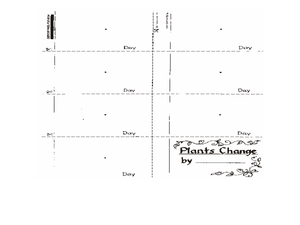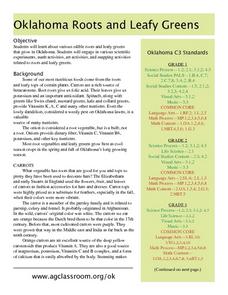Curated OER
SCRUMPTIOUS SOIL
Students engage in investigations that lead to the discovery that earth materials consist of rocks, soils, water, and air. They build models of soil profiles, using breakfast cereal and other edible materials. They observe how water...
Curated OER
What's in a Willow?
Students study of nutritional value of edible native plants. discriminate between foods that have nutritional value and those that do not. They relate how food can affect how they think, feel, and perform.
Curated OER
This Can't be a Plant
Learners grow mold. In this science experiment lesson, students grow mold on different pieces of bread by adjusting the moisture, temperature, and light. They record the results to see which grows the most mold.
Curated OER
Where Does Food Come From?
Students recognize that food we eat comes from farms. In this where does food come from lesson, students discuss planting crops and how they grow. Students plant seeds for edible crops and eat them when are ripe. Students...
Curated OER
Growing Pains
Learners compare common food items with the parts of a plant. They grow their own plants to assess the difficulties in assisting a plant's growth and reproduction.
Curated OER
Fruit or Vegetable?
Watermelon is a vegetable? A tomato is a fruit? Believe it or not, this debate is decades old. Groups examine rulings by the US Supreme Court, the USDA, and state statutes before developing their own criteria to use when labeling...
Curated OER
Nutrients for Plants and People: Food Pyramid Garden
In this garden worksheet, students plant different types of food from the food pyramid into a garden and write a journal about all of the food. Students plant 4 levels of food from the food pyramid.
Curated OER
The Peanut Wizard
Students read and discuss information regarding George Washington Carver and how the peanut became cultivated in the southern colonies of the United States. In this George Washington Carver lesson plan, students develop vocabulary that...
Curated OER
From Genes to Jeans
This unit of lessons is designed for 7th through 9th graders. They are introduced to the world of agriculture and the genetic research and various technologies that are associated with agriculture. Pupils work together to come up with a...
Curated OER
Survival of the Fittest
Students explore plant needs and growth. In this plant science lesson, students use a cereal box to complete a plant growth graph activity.
Curated OER
Cells
Students learn about cells. In this cells lesson plan, students take several days to learn about plant and animal cells and make their own edible cells with a cookie and icing.
Curated OER
PLANT PARTS WE EAT
Students identify an assortment of vegetables and learn how to locate the parts humans use for food. Students identify the plant parts we eat. Students color the pictures on their worksheets as provided. Students match the plants to the...
Curated OER
The Seed Match
Students study seeds and plants. In this science lesson plan, students explore seeds from various types of plants and complete a worksheet about seeds. Students discuss plants that are fruits and vegetables and where they grow.
Curated OER
Cell Reviews
Students draw cells, make a cell, and list organelles in plant and animal cells. In this cells lesson plan, students create edible cells.
Curated OER
From McGee's Farm to the Movies
Students participate in several plant-themed activities. They keep a food log, identify any plants they have eaten and then classify these foods by the part of the plant that is edible. Students sing songs about plants, make collages,...
Curated OER
Don't Wait, Just Propagate
Students explore the process of growing plants from seed. In this propagation lesson plan, students examine methods of propagation and determine how to rapidly propagate plant species. Students listen to a lecture informing them on the...
Curated OER
Plant Seedling
Students label seed parts and plant seeds. In this seeds lesson plan, students observe and learn about how seeds play a huge role in all plants and food.
Curated OER
Growing Tomatoes from Seed
In this growing tomatoes worksheet, learners experience and participate in the process of growing tomatoes over a three or four month span of time. Students follow six directives in producing tomato plants.
Curated OER
Lesson #5: Symbiosis and Coral Anatomy
Fifth graders examine the basic structure of corals and the concept of symbiosis. They watch a Powerpoint Presentation, develop an original pair of organisms living symbiotically, and create an edible model of a coral polyp.
Curated OER
The Beet Goes On
Root vegetables inspire the series of activities included here. Class members participate in activities related to language arts, social studies, science, visual art, and math. At first, the long list might feel overwhelming; however,...
Curated OER
Limu in Your Lunch
Students explore various types of algae found in Hawaii. In this science lesson, students research species of the three types of limu and identify various uses. Students explore products that contain limu.
Nuffield Foundation
Microbes Ate My Homework
Now you have a new excuse not to do your homework. A long-term experiment has learners explore cellulose-digesting enzymes. They simulate how paper breaks down in a compost bin. There's no need to blame your dog for eating your homework...
Curated OER
Plankton in the Air
Here is a lab activity adequate for use with any full lesson plan on environmental factors that shape animal adaptations or marine animal characteristics. Pupils will discuss the role plankton plays in the environment and filter-feeding...
Cornell University
Study Soil
What's in soil? Young scientists study the pH levels of soil from their school yard. They observe the land and area the soil came from to decide if location has anything to do with acidity level.























